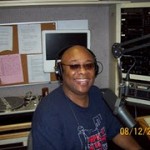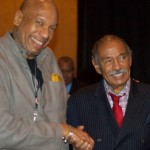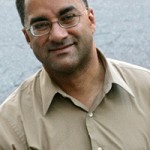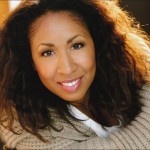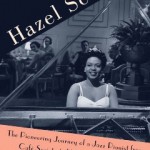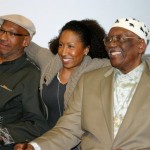Okay, okay… yes, here’s yet another year-end poll. Some of you Independent Ear readers may recall our revealing series of dialogues with black music writers (that is, writers on the subject of music who happen to be African American) which we dubbed “Ain’t but a few of us” – as in, there’s a significant number of folks writing about jazz and black music, but not as many African Americans as there should be. Well, as we close out 2011 we’ve asked that crew to weigh in with their best-of list from 2011 record releases (designated below according to the writer’s choice); and to also include what for them was the most compelling book they read in 2011 (any subject), and their favorite live music performance experience. Here’s what they had to say (recordings listed by artist, title, label):
BRIDGET ARNWINE
Favorite Recordings of 2011 (“in no particular order, except for #s 1 and 2)
Freddie Hubbard, Pinnacle, Resonant
Delfeayo Marsalis, Sweet Thunder
(Orrin Evans) Captain Black Big Band, Captain Black Big Band, Posi-Tone
Branford Marsalis & Joey Calderazzo, Songs of Mirth and Melancholy, Marsalis Music
Helen Sung, (re)Conception
Gonzalo Rubalcaba, Fe/Faith
James Farm, James Farm, Nonesuch
Wayne Wallace, To Hear From There,
Jeff “Tain” Watts, Family
Terri Lyne Carrington, The Mosaic Project, Concord
Favorite book of 2011 (“I wouldn’t call it compelling”): Decoded by Jay-Z and Dream Hampton
Favorite live music performance: James Farm at the Clarice Smith Center for the Performing Arts, September 2011
EUGENE HOLLEY, JR.
Recordings (not listed in any particular order):
Ambrose Akinmusire, When the Heart Emerges Glistening, Blue Note
Orrin Evans, Captain Black Big Band, Posi-Tone
Charles Lloyd-Maria Farantouri, The Athens Concert, ECM
Ben Williams, State of Art, Concord
Deep Blue Organ Trio, Wonderful!, Origin
Kurt Elling, The Gate, Concord
Enoch Smith, Jr., Misfits, Music 4MYPeople Entertainment
James Carter Organ Trio, At the Crossroads, EmArcy
Warren Wolf, Warren Wolf, Mack Avenue
Fabian Almanzan Trio, Possibilities, Biophilla/Palmetto
Book: Rifftide: The Life and Opinions of Papa Joe Jones, by Papa Jo Jones/Paul Devlin (as told to Albert Murray)
Live: Esperanza Spalding at The Roots Picnic, Philadelphia, PA
ROBIN JAMES
Top 1-10 Records Released in 2011
Jill Scott, The Light of the Sun, Blues Babe Records
Various Artists, !Rumba Mambo Cha Cha Cha!, Putumayo World Music
Diego Urcola, Appreciation, CamJazz
Freddy Cole, Talk to Me, HighNote
Freddie Hubbard, Pinnacle, Resonance
Ambrose Akinmusire, When the Heart Emerges Glistening, Blue Note
Jeremy Pelt, The Talented Mr. Pelt, HighNote
Nicholas Payton, Bitches, In + Out
JD Allen Trio, Victory!, Sunnyside
Ernestine Anderson, Nightlife: Live at Dizzy’s CLub Coca-Cola, HighNote
Most Compelling Book I’ve read during 2011: Thelonious Monk: The Life and Times of an American Original (paperback edition), by Robin D.G. Kelley
Favorite Live Music performance I’ve experienced during 2011: Debbie Duncan (vocalist) at the Artists’ Quarter, St. Paul, MN (summer)
RAHSAAN CLARK MORRIS
My Ten Best
Jose James and Jef Neve-For All We Know Impulse Records
Terri Lyne Carrington-The Mosaic Project Concord
Larry Gray Trio-Three Equals One CDBY Records
Deep Blue Organ Trio – Wonderful! Origin Records
Cedar Walton – The Bouncer HighNote
Miles Davis – Live in Europe 1967 Columbia Legacy
Benny Green Trio-Source Jazz Legacy Productions
Eliane Elias-Light My Fire Concord
Greg Ward Fitted Shards- South Side Story 19/8 Records
Jason Adasiewicz-Sun Rooms Delmark Records
My favorite read was a toss-up: Thelonious Monk: The Life and Times of an American Original by Robin Kelley and Diggin: The Afro American Soul of American Classical Music by Amiri Baraka
My favorite performance was Mike Reed’ (truncated) People, Places, and Things Quartet with Greg Ward live at The Green Mill Jazz Club in early June.
JOHN MURPH
Top 10 Jazz
JD Allen Trio, Victory, Sunnyside
Gretchen Parlato, The Lost & Found, Obliq Sound
Terri Lyne Carrington, The Mosaic Project, Concord
The Claudia Quintet +1, What is the Beautiful?, Cunieform
Ambrose Akinmusire, When the Heart Emerges Glistening, Blue Note
Chris Dingman, Walking Dreams, Between Worlds
Zara MacFarlane, Until Tomorrow, Brownswood
Denys Baptiste, Identity by Subtraction, Dune
Miguel Zenon, Alma Adento: The Puerto Rican Songbook, Marsalis Music
David Binney, Graylen Epicenter, Mythology
Favorite book: African Rhythms, the Autobiography of Randy Weston, Composed by Randy Weston; Arranged by Willard Jenkins
GENE SEYMOUR
Top Ten Jazz Discs For 2011
Sonny Rollins, Road Shows Vol. 2, Doxy
Ambrose Akinmusire, When the Heart Emerges Glistening, Blue Note
Noah Preminger, Before the Rain, Palmetto
Allen Lowe, Blues and the Empirical Truth, Music & Arts
Muhal Richard Abrams, SoundDance, Pi
Craig Taborn, Avenging Angel, EMI
Youn Sun Nah, Same Girl, ACT
Bill Frisell, Sign of Life, Savoy
Miguel Zenon, Alma Adento: The Puerto Rican Songbook, Marsalis Music
Evan Christopher, Remembering Song, Arbors
GREGORY THOMAS
Favorite 10 Recordings (listed in no particular order)
Aaron Goldberg and Guillermo Klein, Bienestan, Sunnyside
Monty Alexander, Harlem-Kingston Express, Motema
Christian McBride, Conversations with Christian, Mack Avenue
Miguel Zenon, Alma Adentro: The Puerto Rican Songbook, Marsalis Music
Warren Wolf, Warren Wolf, Mack Avenue
Bobby Sanabria, Tito Puente Masterworks Live!, Jazzheads
Freddie Hubbard, Pinnacle, Resonance
Jimmy Owens, The Monk Project, Ipo
Branford Marsalis & Joey Calderazzo, Songs of Mirth and Melancholy, Marsalis Music
JC Stylles, Exhiliration and Other States, Motema
RON WYNN
Top 10
David Murray Cuban Ensemble, Plays Nat King Cole en Espanol, Motema
Roy Haynes, Roy-alty, Dreyfus
Branford Marsalis & Joey Calderazzo, Songs of Mirth and Melancholy, Marsalis Music
Joe Lovano and Us Five, Bird Songs, Blue Note
David Sanchez/Stefon Harris/Christian Scott, Ninety Miles, Concord
Brad Mehldau, Live in Marciac, Nonesuch
Terri Lyne Carrington, The Mosaic Project, Concord
Kurt Elling, The Gate, Concord
Sonny Rollins, Road Songs Vol. 2, Doxy
Tierney Sutton, American Road, BFM
Books (music) New Atlantis: Musicians Battle for the Survival of New Orleans, by John Swenson
(general) Malcolm X: A Life of Reinvention, by Manning Marable
Top musical event: (“easy choice”) Sonny Rollins Quartet at the Schermerhorn Symphony Hall (Nashville, TN)
WILLARD JENKINS
2011 faves in no particular order
(More than 10 here? Call that editor’s license.)
Miles Davis Quintet, Live in Europe 1967-The Bootleg Series, Columbia
Terri Lyne Carrington, Mosaic Project, Concord
JD Allen, Victory, Sunnyside
Wynton Marsalis & Eric Clapton, Play the Blues, Reprise/JALC
Charles Lloyd, Athens Concert, ECM
Terell Stafford, This Side of Strayhorn, MaxJazz
Randy Weston, Blue Moses, CTI (reissue)
David Murray Cuban Ensemble, Plays Nat King Cole en Espanol, Motema
SF Jazz Collective, Music of Stevie Wonder, SF Jazz
James Farm, James Farm, Nonesuch
Ben Williams, State of Art, Concord
Muhal Richard Abrams, Focus Thru Time, Pi
Marcus Shelby, Soul of the Movement, Porto Franco
Jerry Gonzalez, El Commando de Clave, Sunnyside
Dennis Rollins Velocity Trio, The 11th Gate, Motema
Miguel Zenon, Alma Adentro, Marsalis Music
Book: (tossup) Malcolm X: A Life of Reinvention, by Manning Marable
High on the Hog: A Culinary Journey from Africa to America, by Jessica B. Harris
Live performance:Sing the Truth (Dianne Reeves, Angelique Kidjo, Lizz Wright, Terri Lyne Carrington, Geri Allen, etc.), Tanglewood Jazz Festival, September 4

